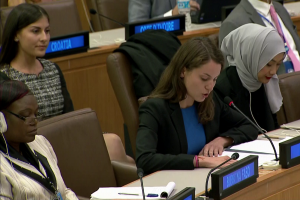
Youth delegates share views on key development issues with UNGA Third Committee
 Delegates in the Third Committee (Social, Humanitarian and Cultural) shared the floor with youth representatives this week, grappling with issues of inequality, unemployment and xenophobia that hampered young people’s advancement, as they concluded their two-day debate on social development.
Delegates in the Third Committee (Social, Humanitarian and Cultural) shared the floor with youth representatives this week, grappling with issues of inequality, unemployment and xenophobia that hampered young people’s advancement, as they concluded their two-day debate on social development.
“There is an opportunity in front of us, to unlock the potential in young people all around the world – turning the ‘youth bulge’ into a demographic dividend that delivers tangible economic and development progress,” Australian youth delegate Chris Eigeland said in his statement.
Education was high on the list of priorities for delegates, both young and older, many of whom called for greater access to quality education and better employment opportunities.
Youth delegates reminded Member States that while education was a human right, 59 million children of primary school age remained out of school. Many of them had been displaced by war and violence, which made the current refugee and migrant crisis a generational one.
Failure to provide education to young refugees would lead to a lost generation, Sweden’s representative, Noura Berrouba, warned: “Education is a human right, a cornerstone of critical thinking and a necessity for self realization. Education is a global catalyst for gender equality, health, peace, poverty eradication and sustainable development,”
On that point, Turkey’s representative explained that his country was host to more than 3 million refugees – a situation that posed challenges to the country’s social development agenda. He called for greater support for host countries and the sharing of responsibility for the crisis.
In turn, delegates shared steps their Governments had taken to include young people in policy making, with Singapore’s speaker, Tangie Kay, noting an increase in youth volunteerism and involvement in interest groups.
“The growth of the youth eco-system is essential to encourage youths to give back to the community,” Kay said. “It is therefore essential that we continue to engage our youths by providing them with a conducive environment, maximising their opportunities and expanding their networks.”
Senegal had set up a national youth council to involve young people in social decisions, that country’s representative said. Honduras’s representative said his Government had ratified the Ibero-American Convention on the Rights of Youth in 2006, and had since included young people in formulating policies and implementing programmes.
Taking a broad perspective, Nigeria’s representative urged the United Nations to create a youth agency that would integrate youth issues throughout the 2030 Agenda.
The Third Committee of the UN General Assembly is mandated to tackle questions of human rights, as well as social issues impacting vulnerable group in society, including women, children, indigenous peoples, refugees. Every year, the committee consults a group of youth representatives, providing a podium for the young leaders to share their visions on key topics in global development.
The Youth Delegate Programme is coordinated by the United Nations programme on Youth in UN DESA’s Division for Social Policy and Development (DSPD) at the global level, though it is the responsibility of the Member States to establish a youth delegate programme at the national level, and to select who will represent the young people of their country.
As participation in decision-making is one of the central priorities of the United Nations agenda on youth, it is encouraging that more than 60 youth delegates (from 35 counties) are slated to attend the 71st session of the General Assembly as part of their official Member State delegations this year and that the list continues to grow.
Source: UN DPI Meetings Coverage
